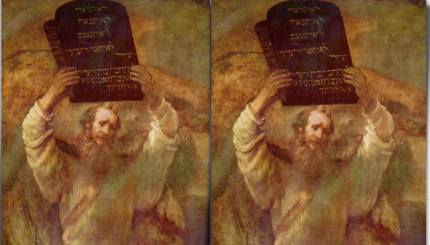Commentary on Parashat Shmini, Leviticus 9:1-11:47; Exodus 12:1-20
Parshat Shmini contains one of the most disturbing death scenes of the entire Torah. Nadav and Avihu, sons of Aaron the high priest, make an unauthorized incense offering — with immediate and deadly results. As Leviticus 10:2 describes: “There came forth fire from before the Lord, and devoured them, and they died before the Lord.”
Albeit striking, the supernatural strafing is not the only thing that makes these fatalities unusual. For although many deaths are mentioned in the Torah, few are described in terms of the mourning that follows. Here, the Torah goes on to reference torn clothing, disheveled hair and crying as reactions to these losses. All three are elements of traditional Jewish mourning practice that continue to this day.
Jewish law makes allowances for people who need to maintain professional standards in their self-presentation, but abstaining from haircuts and other grooming is a traditional way to embody one’s experience as a mourner. In this way, an outer unkempt appearance can mirror the psychological disturbance within. It is a visible signal of one’s tenderness and distress, at least to those who know how to read it.
Similarly, tearing clothing is an outward expression of the profound inner rupture death occasions. This mitzvah, known as kriah (rending), is performed by the immediate family of the deceased just before the funeral begins. Though nowadays many mourners instead tear little black ribbons affixed to their clothes, there is something painfully real about ripping a garment. The sound of cloth tearing and the sense of an irreversible splitting — which can perhaps be outwardly mended, but never again made whole and unscarred — is often enough to help the tears start to flow. I will always remember the sight of a man who had been unexpectedly widowed tearing open the breast of the shirt he had made for his wedding day. The rip across his chest was an expression of his broken heart that all could see and understand, an expression as eloquent as it was wordless.
And indeed, silence is one other element of mourning that this Torah portion introduces. In the verse immediately following the deaths of Nadav and Avihu, Moses says to their father, Aaron:
“This is what the Lord has said: ‘By those that are close to me will I be sanctified, and I will be honored among the people at large.’ And Aaron was silent.” (Leviticus 10:3)
The commentators understand this in various ways. Nachmanides interprets Moses’ words as genuinely comforting to Aaron. Reassured that the sudden deaths of his children was somehow a mark of divine favor, Aaron’s weeping ceased and he was silent. Rabbenu Bahya, meanwhile, remarks that silence is itself one way that grief can be expressed. This perhaps is hinted at in the famous passage from Ecclesiastes, which parallels “a time for ripping (kriya) and a time for sewing,” with “a time for silence and a time for speaking.” (Ecclesiastes3:7)
Nor is silence only for the mourners themselves. Knowing how hard it can be for someone in grief to find words at all, the Talmud (Moed Katan 28b) advises that those who go to comfort them be silent and wait. Indeed, the Talmud says that the main thing that makes visiting a house of mourning meritorious is being quiet.(Brachot 6b)
Maurice Lamm writes in The Jewish Way in Death and Mourning: “It is absurd to say to someone, deep in anguish over someone they loved, ‘Hello. How are you feeling?’ How should they feel? This not only is a question that cannot be answered; it indicates a touch of mindlessness.”
Readers of the Torah might feel that Moses’ comment to Aaron is just such an example of mindlessness. Seen thus, “and Aaron was silent” could speak of self-restraint. Without such restraint, Aaron might perhaps have lashed out at Moses. Or perhaps — as the biblical Job’s wife repeatedly adjures him to in the face of similar losses — he might have used the moment to blaspheme, deliberately inviting divine retribution to take him too.
In general, the sages admire silence, seen as a manifestation of wisdom and depth. “All my life I have grown up amongst the wise,” says Rabbi Shimon, “and I have found nothing better for a person than silence.” (Pirkei Avot 1:17) But ultimately, it may be that silence is the truest response to death, that inscrutable boundary into the great silent unknown. When Jews say “Blessed is the True Judge” on hearing of a loss, we actively state the limits of our understanding, asserting that there must be some justice beyond what we can construe. Silence is a recognition that we know we do not know.
For in the face of that which is inherently beyond our grasp, words fail. And that’s okay. Silence itself bespeaks the depth. As the Psalmist says: “To you, silence is praise.” (Psalms 65:2)
This article initially appeared in My Jewish Learning’s Reading Torah Through Grief newsletter on April 14, 2023. To sign up to receive this newsletter each week in your inbox, click here.
Looking for a way to say Mourner’s Kaddish in a minyan? My Jewish Learning’s daily online minyan gives mourners and others an opportunity to say Kaddish in community and learn from leading rabbis.



